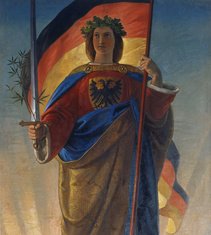|
Question or Term
|
Answer
|
|
An uprising in Vienna in March 1848 leading to the exile of Minister President Prince Klemens von Metternich and reigniting the previous months demands for reform across the German states including again in Baden
|
March Revolution
|
|
A series of food riots in Berlin in 1847
|
Potato Revolution
|
|
Those geographic areas of high population density within the German states in which the 1848 Revolutions were centred
|
Urban areas
|
|
He who was made Minister President of Prussia in November 1848 after the replacement of the liberal ministry, who immediately ordered the dissolution of the citizen's militia and the imposition of martial law, practically ending the revolution in Berlin with little resistance
|
Count of Brandenburg (1792 - 1850)
|
|
That social class which particularly resented the restrictions of the political systems in the German states due to their political exclusion, censorship, and the actions of the secret police
|
Middle Class
|
|
A moderate liberal and head of the Austrian State Council who dominated Austria's domestic affairs from 1826 to 1848, being a major opponent of Prince Klemens von Metternich
|
Count Franz von Kolowrat (1778 - 1861)
|
|
An indecisive parliament consisting mostly of liberals - though a third of members being radicals - elected in April 1848 under the new Prussian liberal ministry, first meeting in May with the task of drawing up a new constitution, which steadily lost authority and support over the course of the year
|
Prussian National Assembly
|
|
An 1849 proposal by Austrian Minister President Prince Felix of Schwarzenberg to establish a customs union between Austria and the Zollverein which - like his later 1851 proposal for a customs union of German states then outside the Zollverein - failed to materialise
|
Zollunion
|
|
The King of Prussia from 1840 to 1861, who was famously unstable, his policy fluctuating widely (relaxing then re-imposing censorship, summoning then dissolving the united diet, &c.) though in part to try and balance the competing demands of liberals and Junkers
|
Frederick William IV (1795 - 1861)
|
|
Those two states that together had formed a customs union in southern Germany, in alphabetical order
|
Bavaria and Württemberg
|
|
|
Question or Term
|
Answer
|
|
The emperor of Austria who abdicated the throne in December 1848 in favour of his nephew Franz Joseph I after uprisings, the failure of his two more liberal manifestos in appeasing protesters, and the defeat of his army in Hungary
|
Ferdinand I (1793 - 1875)
|
|
The country in which the 1848 Revolutions began, ultimately leading to the abdication of its monarch in February
|
France
|
|
An 1847 meeting of various liberal figures from across the German states which met to discuss proposals for democratisation within their territories, including an elected national assembly to control and restrict autocratic monarchs
|
Hippenhelm Meeting
|
|
The geographic divide within Germany in which the north was Protestant while the south remained Roman Catholic, complicating efforts for German unification
|
North-South
|
|
The imposition of tariffs on foreign imports so as to protect domestic industry and agriculture, notable for being an Austrian economic policy which isolated them, particularly in comparison to the Prussian controlled Zollverein
|
Protectionism
|
|
A term used by Karl Marx to refer to the primarily industrial working classes
|
Proletariat
|
|
That body, much weakened due to internal divisions, a lack of legitimacy or international recognition (i.e. France and Russia), being without financial powers or a national army - Prussia being the only state able to fill such a role, Austria and Bavaria having refused - and a lack of popular support or confidence, being in opposition to the industrial code
|
Frankfurt Parliament
|
|
The period from 1815 to the outbreak of the March 1848 revolutions in Berlin and Vienna, characterised by reactionary politics and repression
|
Vormärz
|
|
A code put forward by the Artisan Congress in Frankfurt during the 1848 revolutions that sought to protect the restrictive nature of the guild system, to opposition from the Frankfurt Parliament, discrediting the latter in the eyes of many artisans and craftsmen
|
Industrial Code
|
|
The decade, during the first half of which, the Prussian Customs Unions' two competing customs unions collapsed with many of their members joining the newly formed Zollverein
|
1830's
|
|

